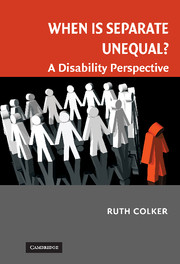Book contents
- Frontmatter
- Contents
- Preface
- Acknowledgments
- 1 Introduction
- 2 Anti-Subordination Above All: A Disability Perspective
- 3 The Mythic 43 Million Americans with Disabilities at the Workplace
- 4 K–12 Education
- 5 Higher Education and Testing Accommodations
- 6 Voting
- 7 Reflections on Race: The Limits of Formal Equality
- Index
7 - Reflections on Race: The Limits of Formal Equality
Published online by Cambridge University Press: 05 June 2012
- Frontmatter
- Contents
- Preface
- Acknowledgments
- 1 Introduction
- 2 Anti-Subordination Above All: A Disability Perspective
- 3 The Mythic 43 Million Americans with Disabilities at the Workplace
- 4 K–12 Education
- 5 Higher Education and Testing Accommodations
- 6 Voting
- 7 Reflections on Race: The Limits of Formal Equality
- Index
Summary
In this book, i have argued that the formal equality model has not been well equipped to help attain substantive equality for individuals with disabilities, because it does not correctly target who is deserving of assistance and has not been effective in developing appropriate remedies. Chapter 3 argued that the courts have undermined Congress's attempts to legislate an anti-subordination model in the employment context under the Americans with Disabilities Act by failing to protect the 43 million Americans whom Congress identified as being entitled to assistance. Chapter 4 demonstrated that Congress presumed under the Individuals with Disabilities Education Act that an integrated educational environment is better than a more segregated educational environment in the K–12 context even though the available empirical data do not support that presumption. I argued that the integration presumption was reflexively borrowed from the racial context without consideration of whether it was effective in the disability context. While Chapter 4 suggested that we have overused integration tools in the K–12 context, Chapter 5 argued that we should be seeking more integrated methods of testing in the higher education context. Once again, empirical data, rather than unwarranted presumptions, should guide policy so that we can help individuals with disabilities attain substantive equality.
- Type
- Chapter
- Information
- When is Separate Unequal?A Disability Perspective, pp. 248 - 276Publisher: Cambridge University PressPrint publication year: 2008



